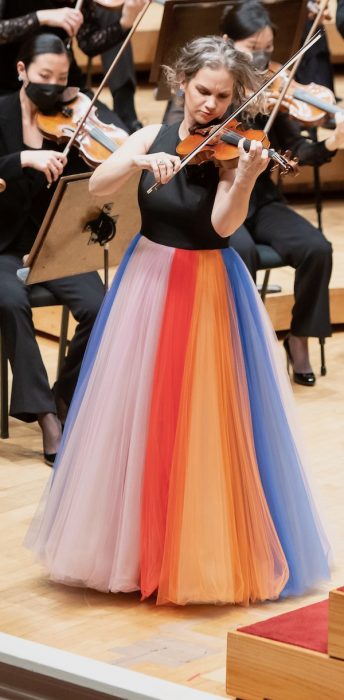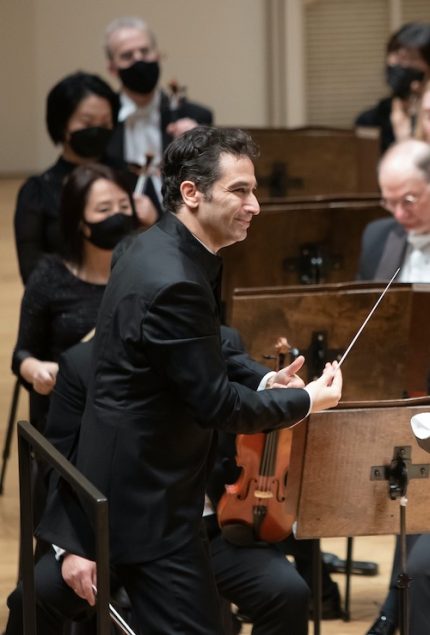Hilary Hahn launches her CSO residency with poised and playful Dvořák

The past month has been a good one for music of Antonin Dvořák at Orchestra Hall. In November Jakub Hrůša led the Chicago Symphony Orchestra in an exhilarating performance of the Czech composer’s infrequently heard Symphony No. 6. And Thursday night Hilary Hahn returned to Chicago as solo protagonist in Dvořák’s Violin Concerto.
The American violinist’s appearance this week is the first fruit of Hahn’s appointment as the orchestra’s debut artist-in-residence. Though most of the ancillary plans remain nebulous, she will take part in educational activities with local young musicians today and tomorrow, as well as a special benefit event on Sunday to support such CSO programs.
But most of us will experience Hahn’s two-year appointment through her more frequent local performances. And any initiative that brings this greatly gifted musician to Chicago more than once a season is something to be applauded. (She returns April 1 for a chamber concert of trios).
Dvořák’s Violin Concerto was given its U.S. premiere by the CSO under Theodore Thomas in 1891 with concertmaster Max Bendix as soloist. The concerto is wholly characteristic in its graceful mix of solo brilliance with Czech-flavored melody, skillfully alternating nervy virtuosity with arching lyricism.
Hilary Hahn is one of those rare musicians who brings not just sterling technical gleam but individuality and communicative expression to every performance. Clad in a black sleeveless top and color-spectrum skirt, the Baltimore native was clearly in synch with the rustic charm and lyrical essence of Dvořák style as much as the brilliance, dispatching the virtuosic bursts of the stormy opening movement in high style.
Most striking was the way in which she conveyed the fantasia quality of Dvořák’s music—savoring the second part of the main theme or bringing a playful, mercurial quality to the bravura sections. She played with breadth in the lyrical pages, which were daringly spacious at times, yet sustained with the poise and concentration of her playing.
After a seamless attaca segue into the Adagio, Hahn was at her most communicative in the central movement, bringing a hushed reverie to the tender melody and winnowing her silvery tone down to a shimmering thread of glowing tone. The soloist brought a searching intimacy of expression to the main theme and quite beautiful playing, as in her weaving of gentle descants around the two horns in the closing bars.
Andrés Orozco-Estrada, the evening’s conductor, led an accompaniment that, if not quite as nuanced as his soloist, proved mostly simpatico, drawing fiery and spirited playing from the orchestra. The quirky, insistent finale with its off-the-beat accents and early jump on each iteration of the main theme, elicited equally singular touches by Hahn, like the fractional pause at the end of solo phrases. The soloist ratcheted up the rising bursts of jumpy bravura in exciting fashion leading to the orchestra’s emphatic four-note coda to round off a notable and exhilarating performance.
Repeated ovations brought Hahn back out for an encore. One of the finest Bach violinists of our day, she offered the Largo from the Sonata No. 3 in C Major, BWV 1005, rendered with rapt purity and elevated, soul-easing expression.

The evening led off with the world premiere of Gabriela Lena Frank’s Haillí-Serenata, the second serenadey CSO commission debuted in as many weeks.
Haillí-Serenata is inspired, like nearly all of Frank’s works by her diverse lineage (Peruvian, Chinese, Lithuanian and Jewish). In this specific case, the inspiration was a trip to Cajamarca, Peru, where the Incas were defeated by the Spanish army. There she saw cantadiores mestizos accompanying themselves on guitars while praying to their ancestors. (Haillí is “prayer” in Quechua, the indigenous language of the Incas.)
Scored solely for strings, Frank’s new work is the polar opposite of Magnus Lindberg’s Serenades, which was unveiled last week. Where Lindberg’s score was brassy, hard-charging and virtuosic, Haillí-Serenata is quiet, intimate and reflective. Against a strummed accompaniment in cellos and basses, a seesawing, gently insistent theme appears in violas, soon passing to violins, in a hushed score that never rises above a pianissimo. If Haillí-Serenata doesn’t avoid a repetitive quality even in its brief eight-minute span, Frank’s score communicates a certain hypnotic aura in its spiritual melancholy. Orozco-Estrada led a dynamically alert performance with sensitive string playing that made a worthy case.
Tchaikovsky’s Symphony No. 5, which closed the evening, may not have offered the last word in innovative programming. But this Russian warhorse is popular for a reason and the best performances can still make a strong impact even for those who have heard the work hundreds of times.
Surprisingly, such was the case Thursday night. Previous CSO appearances by Orozco-Estrada in 2016 and 2018 were decidedly mixed, yet on this occasion the conductor had one of his more impressive local stands, directing an impassioned and largely successful Fifth.
Characteristically, there were fitful oddities, in addition to the conductor’s shake-your-booty podium style: failing to tame some brass tuttis, peaking the volume too early in the final movement, and highlighting secondary horn lines for no apparent reason.
Yet on the whole this was a fresh, strongly projected and compelling Tchaikovsky performance. The initial statement of the motto theme in low winds was aptly lugubrious (principal bassoonist Keith Buncke superb all night) and the drama of the first movement went with fire and bristling urgency. David Cooper lofted a noble horn solo in the Andante and Orozco-Estrada assayed the movement’s lyrical ebb and flow skillfully.
The waltz of the third movement provided the necessary graceful respite, and the finale crackled with energy, conductor and musicians keeping momentum surging en route to a brassy and blazingly triumphant coda.
The program will be repeated 8 p.m. Friday and Saturday. cso.org
Posted in Performances



Posted Dec 27, 2021 at 3:02 pm by Alana Chowdhury
I attended your concert in Chicago on December 11th.
You are my idol!!!!
I am a Senior in the Northeast School of the Arts in San Antonio and have submitted my college applications to a number of Universities.